Publisher’s note: This post is the result of an arms length collaboration with Indigenous Tourism British Columbia.
— By Kim Gray
Have you ever visited a place that lights up your senses so much, you don’t want to go to sleep at night? A place where, because it feels so good to be there, you’re determined to savour as much as conceivably possible before you have to leave?
It doesn’t happen often, but, occasionally, a trip can take a traveller by storm. At least, this was our experience during a recent visit to Yuquot — a First Nations name that means “where the winds blow from many directions.”
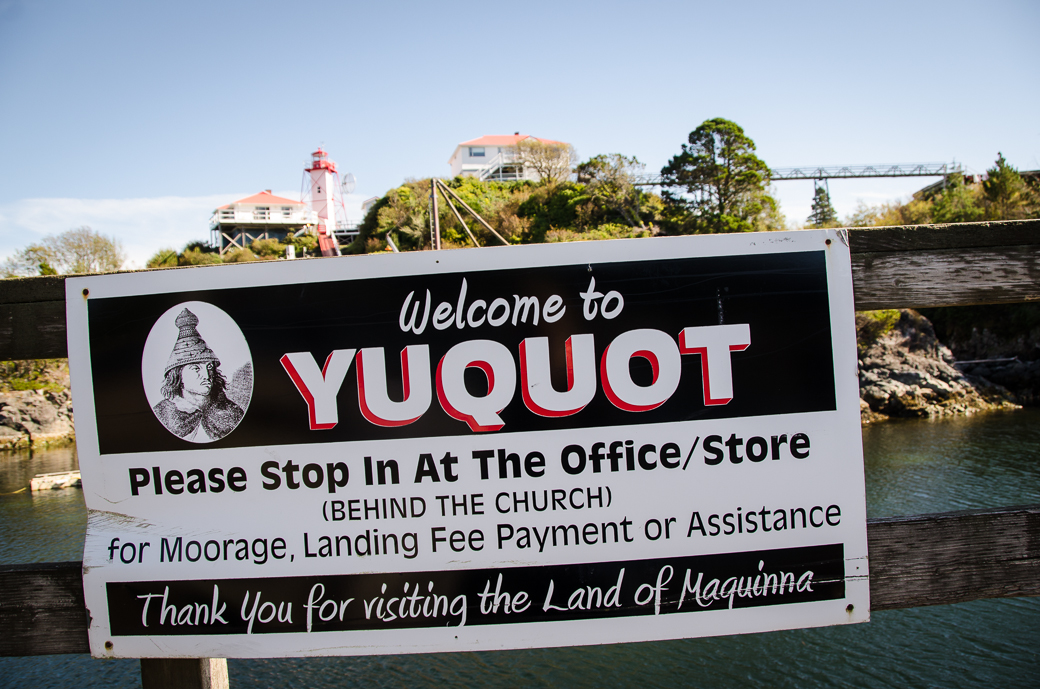
Photo by Suzanne Ahearne for Toque & Canoe
To back up a little, our West Coast adventure launches after (last fall) we receive an invitation from the Aboriginal Tourism Association of British Columbia to join a small but mighty group of people on a unique excursion to Nootka Island.
We are accompanied by a film crew who are to shoot a series of short episodes called Indigenous British Columbia about the cultural, culinary and spiritual landscape of the region, with Top Chef Canada finalist Rich Francis and prominent actor Duane Howard (of The Revenant) in conversation with locals.
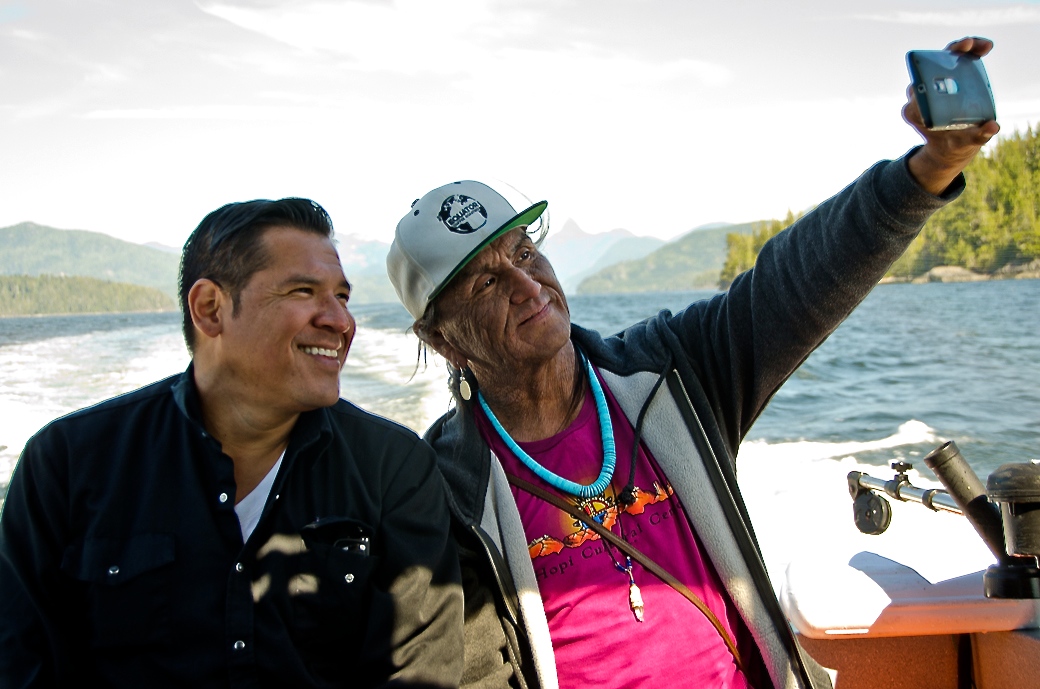
Chef Rich Francis with actor Duane Howard en route to Yuquot / Photo by Suzanne Ahearne for Toque & Canoe
Yuquot, formerly called Friendly Cove and located 90 kilometres northwest of Tofino off Vancouver Island’s west coast, was declared a National Historic Site of Canada in 1923 given its noteworthy place in history.
The village once acted as the central community for all 17 tribes of the Nootka Sound region. It was also the summer home to Chief Maquinna, who led his people during the maritime fur trade in the late 1700s, and it is the original location of the sacred whaler’s shrine — the subject of the National Film Board documentary The Washing of Tears.
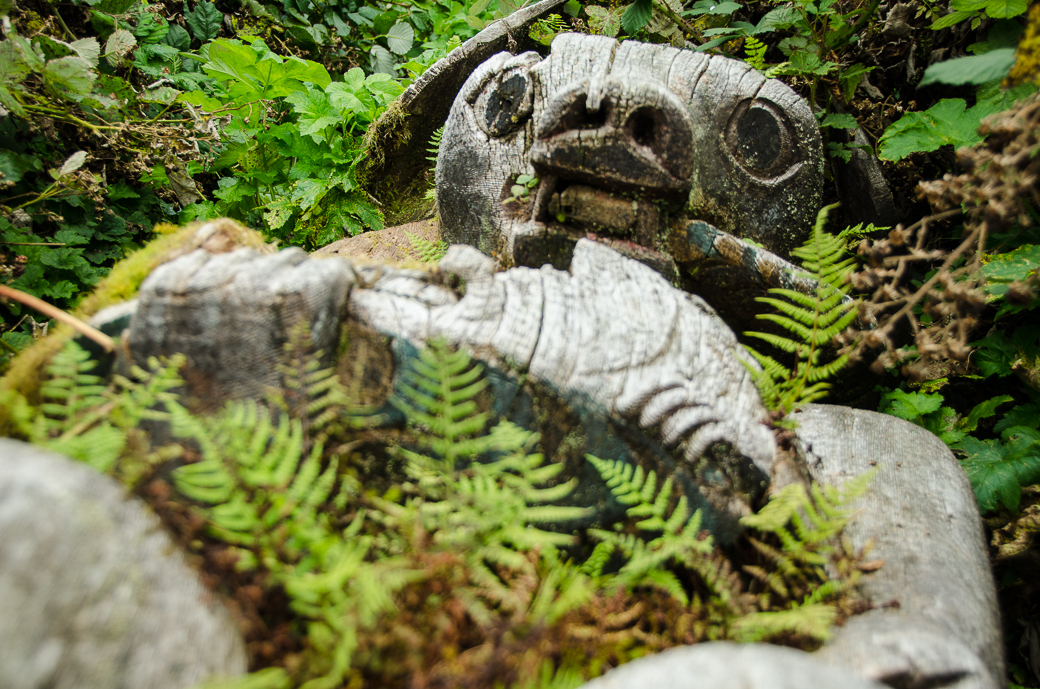
Photo by Suzanne Ahearne for Toque & Canoe
The first point of European contact in the region was made here, as well, with Captain James Cook’s ship arriving in 1778. And, Yuquot was also at the centre of the famous Nootka Sound Controversy, which involved Britain almost going to war with Spain over competing trade and navigation interests in the region.
These days, visitors to the remote area, who often access Nootka Island by float plane or water taxi from Gold River on Vancouver Island, come to camp along the shore, seek refuge in the handful of small lakeside and beachfront cabins or hike the region’s rugged, 35-kilometre Nootka Trail.
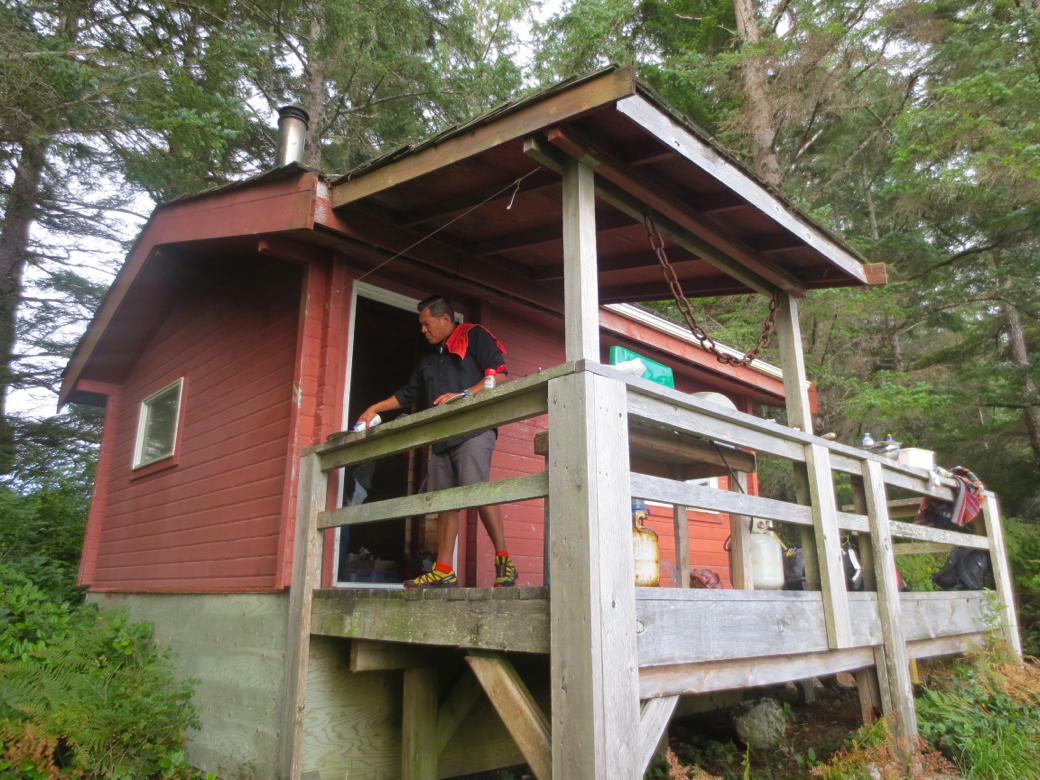
Photo by Toque & Canoe
If guests to the area are lucky, they’ll meet local caretakers and unofficial ambassadors Ray and Terry Williams, members of the Mowachaht/Muchalaht First Nation, who help orient visitors upon their arrival.
And if visitors are really lucky, the couple will escort them, and any luggage, on their trusty ATV along lush rainforest trails to wherever it is the guests need to go.
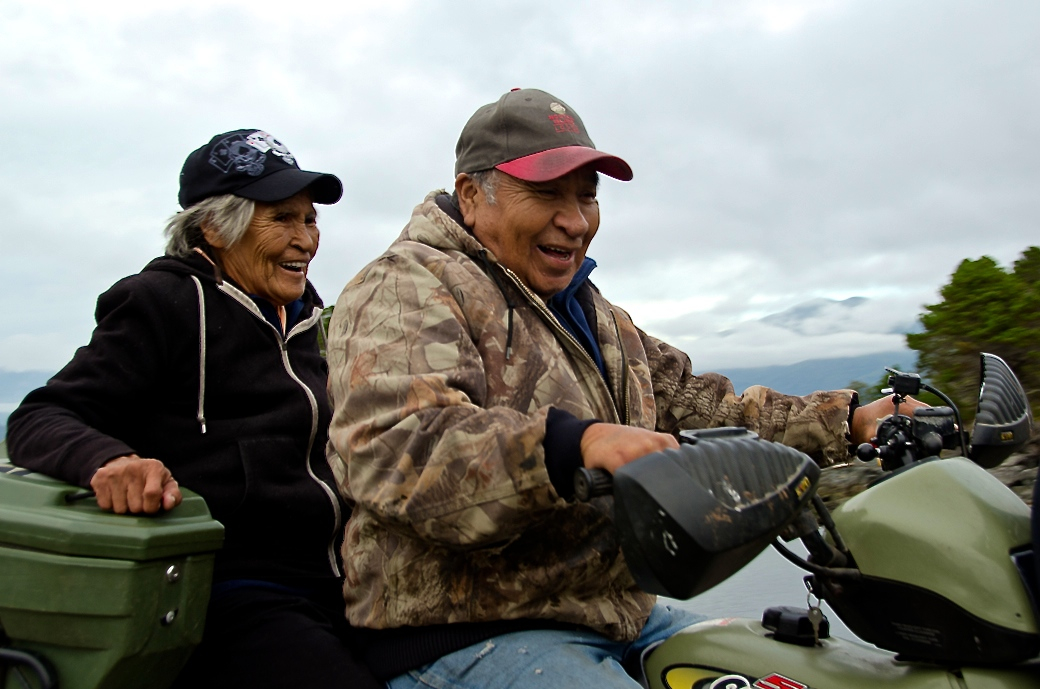
Yuquot elders Terry and Ray Williams / Photo by Suzanne Ahearne for Toque & Canoe
Photographer Suzanne Ahearne and I, who share one of the small red cabins, find ourselves smitten with the warm and generous people of Yuquot, and with the landscape — the old growth trees that surround our accommodations, the wild, rocky shores, the ocean in constant motion and the misty mornings, especially at the point when the sun breaks through to greet us.
The beach, it has to be noted, is not made up of sand, but rather the most polished collection of pebbles you’ll ever run your fingers through. (We would learn later that the late Chief Maquinna’s name means “possessor of pebbles” and we wonder, given his history in Yuquot, if there’s a connection.)
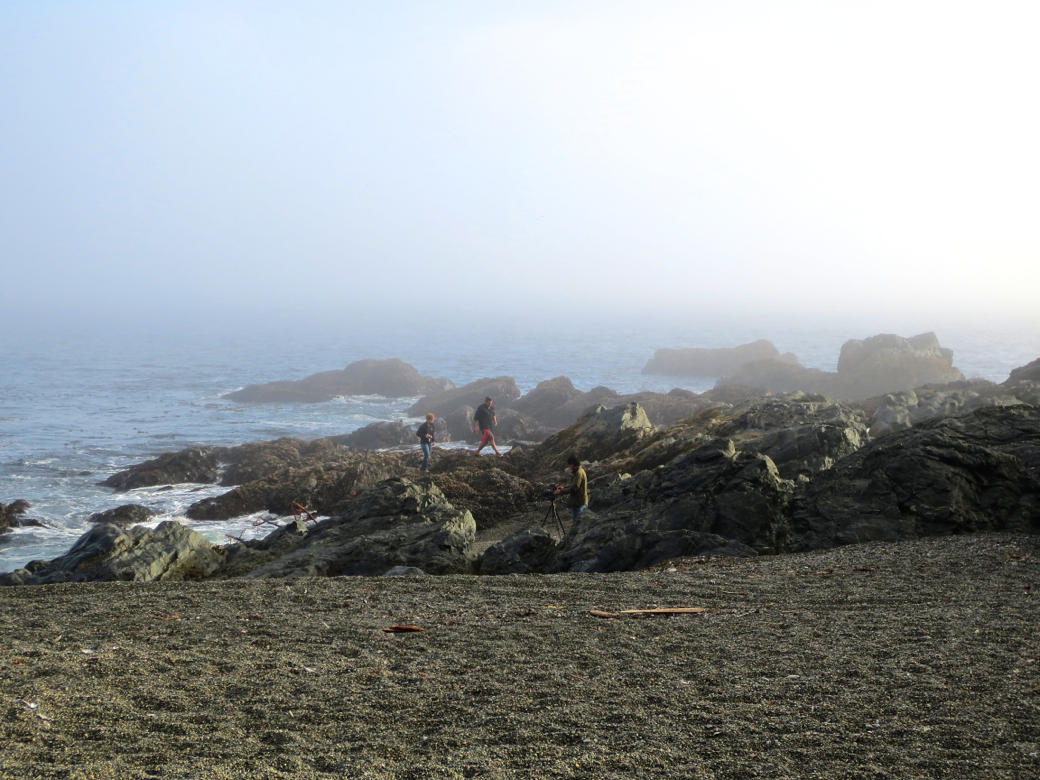
Photo by Toque & Canoe
We enjoy watching Chef Francis — who heads up the kitchen for the duration of our three-day stay — gather mussels from the beach and edible greens from the forest.
We’ve written about him before, in our story Tasting Turtle Island: Aboriginal Cuisine Goes Mainstream, so we’re familiar with his lofty goals to “de-colonize” Aboriginal food and use his approach to cooking and to feeding people as a means for truth and reconciliation.
This is his first visit to Yuquot and he’s blown away. “I like it here,” says the chef, who is originally from the Northwest Territories and a member of the Tetlit Gwich’in and Tuscarora Nation. “It’s rough here, like me. It feels heavily First Nations. Freestyle, not polished.”
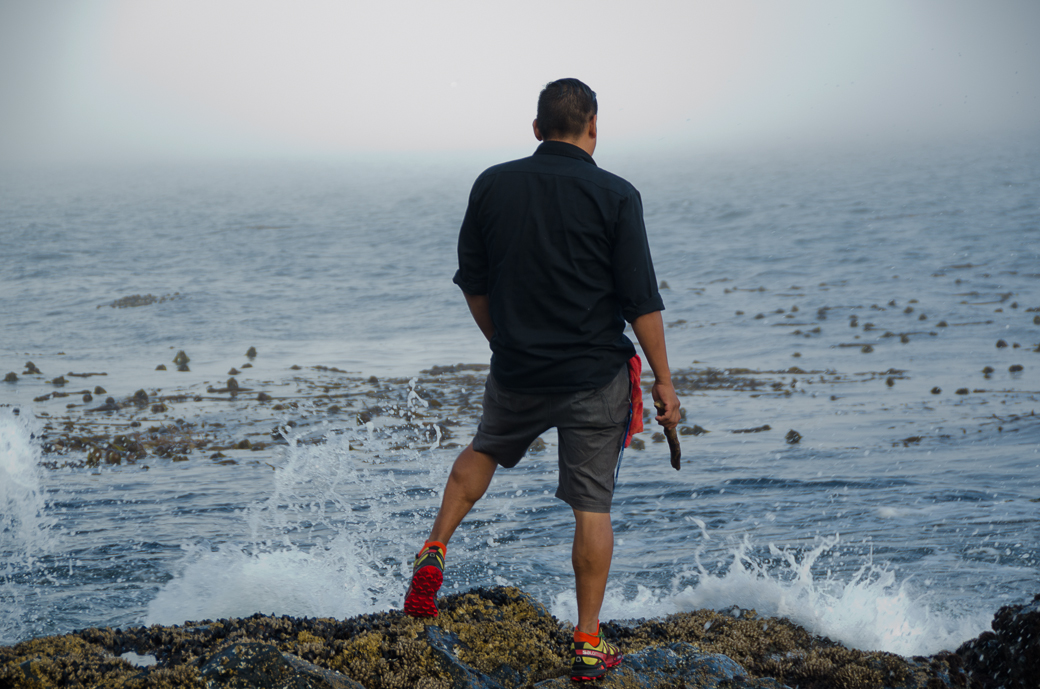
Photo by Suzanne Ahearne for Toque & Canoe
We also enjoy our conversations with Howard, who has roots in this area and who is seen below with his aunt and uncle, Beaulah and Billy Howard.
They’re teaching him how to make traditional rope with strips of cedar using the same technique whalers in the region used for centuries.
“This is my family,” he says, nodding respectfully to his relatives. “There are a lot of people out there who were taken away from their parents. They have no knowledge of their family tree. The result is shame, embarrassment, hurt and panic. It’s important that you know the history of yourself and the history of your people.”
Later, during an interview, Howard pats the giant rock we are sitting on at the beach. “This, this is Grandfather rock,” he announces.
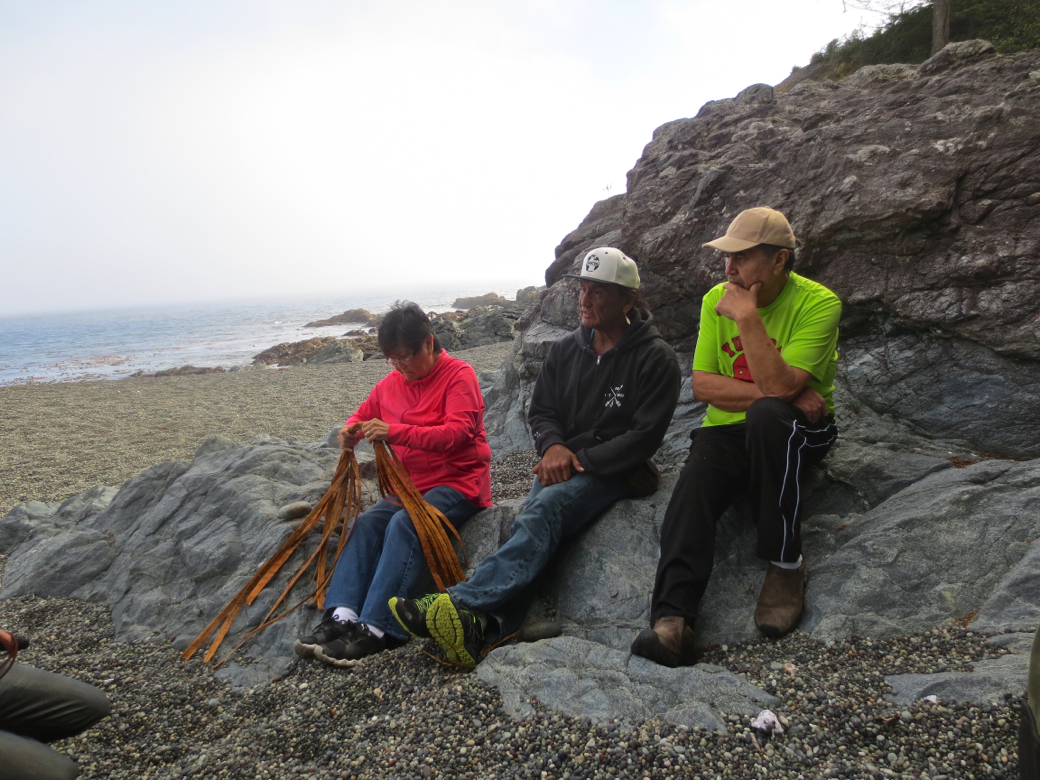
Photo by Toque & Canoe
“Culture saves lives,” Howard says, referring to an adage he teaches regularly as he travels around Canada and speaks to Indigenous youth. He is seen as an important role model given that he has personally overcome drug and alcohol addictions and has found success in Hollywood.
For an actor who has led a heady life hanging out with the likes of Leonardo DiCaprio, and who is seen as a rock star in his own community, he is remarkably humble and grounded.
“I’m just a simple man, sharing my life with the world.”
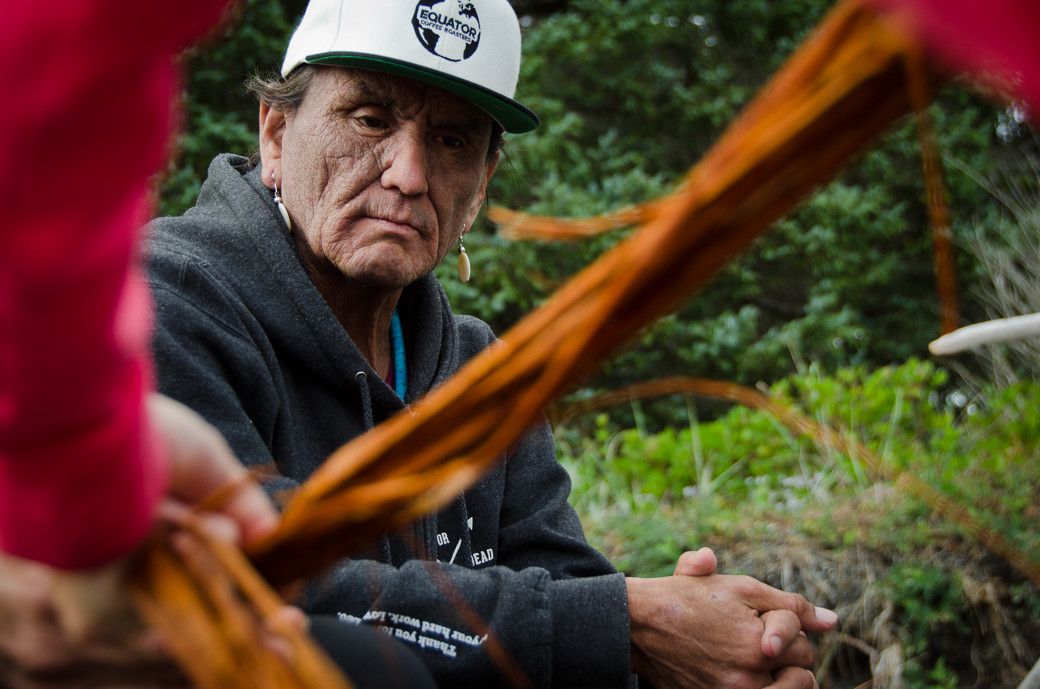
Photo by Suzanne Ahearne for Toque & Canoe
One day, local Ray Williams builds a driftwood fire and tees up a wooden rack gripping a massive slab of fresh caught, bright orange salmon. Williams is demonstrating a traditional method of wind-smoking fish.
He has children, I would discover, who attended the same high school as I did in Victoria years ago. And his son Sanford Williams — whose Indigenous name is Ahtsik-sta Qwayachiik (meaning “The Artistic Wolf”) and whose carving shed we get to visit — is a prominent artist in the province.
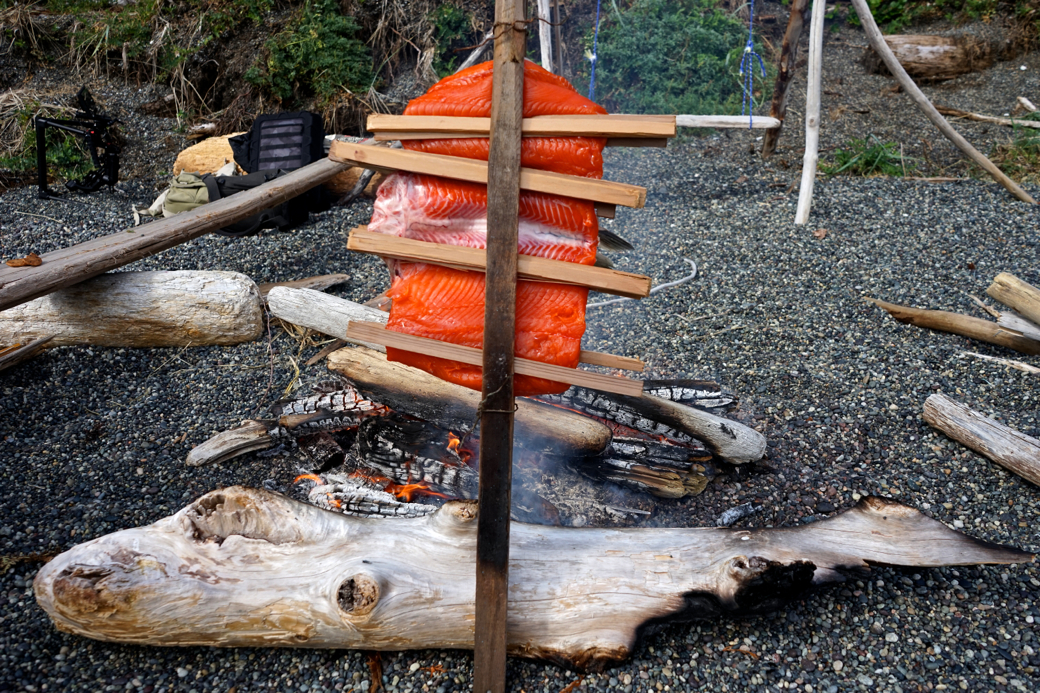
Photo by Toque & Canoe
A highlight during our time in Yuquot revolves around a meal prepared by Francis, where he wraps salmon in seaweed, piles mussels on top, rolls the contents in moss and then secures it all with cedar strips.
He then throws the bundle on a bonfire and steams it with sea water.
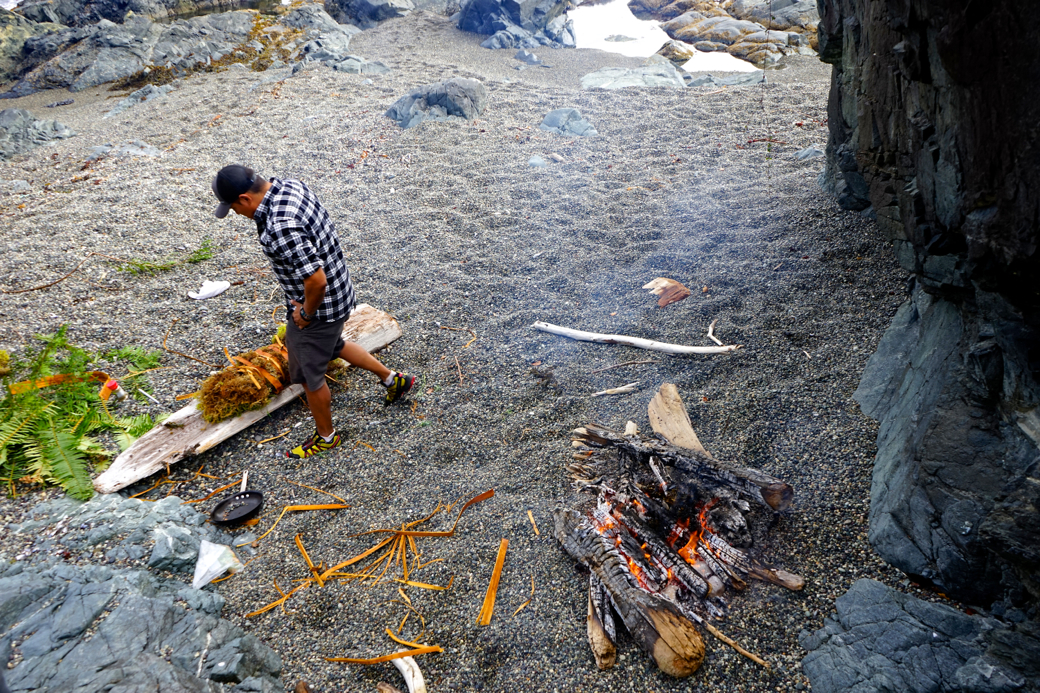
Photo by Toque & Canoe
Imagine, instructs Francis, what the earth and the sea might taste like in one bite. This is exactly what he achieves with this locally-inspired beach feast, shared with a handful of Yuquot residents.
“I’ve been inspired by my time here in Yuquot,” he announces as he offers up his remarkably prepared fare. “This comes from my heart. Thank you for everything.”
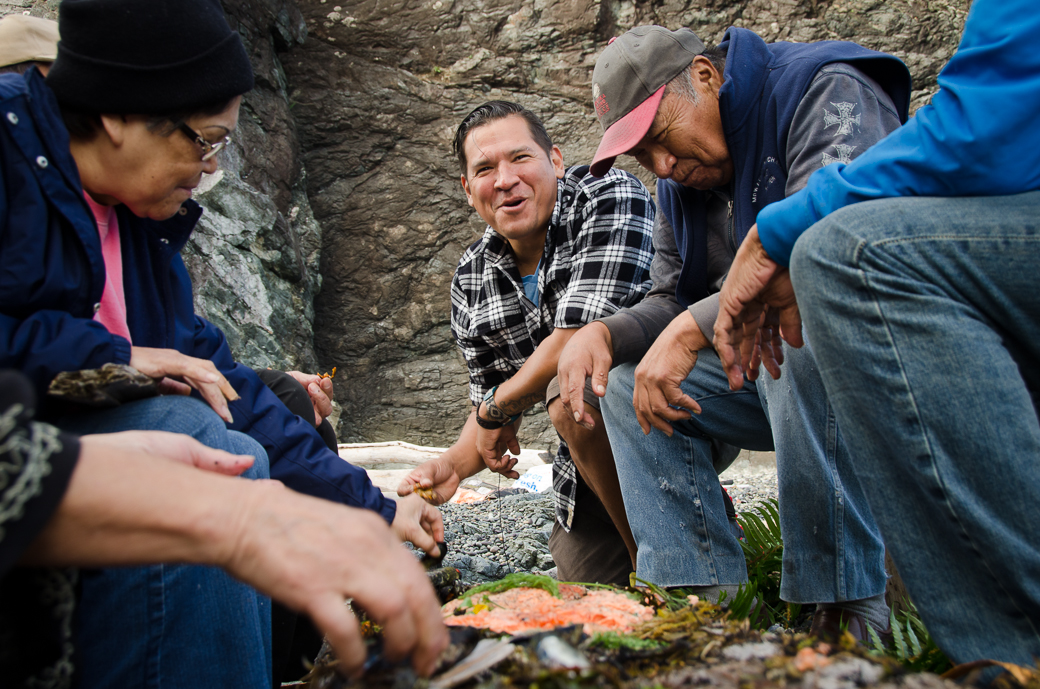
Photo by Suzanne Ahearne for Toque & Canoe
The next evening, Francis goes high brow and we all sit together in our beach front cabin and enjoy, at sunset, a sophisticated and delicately flavoured seafood soup featuring tender slices of halibut, with taste-bud exploding barbecued peaches for dessert.
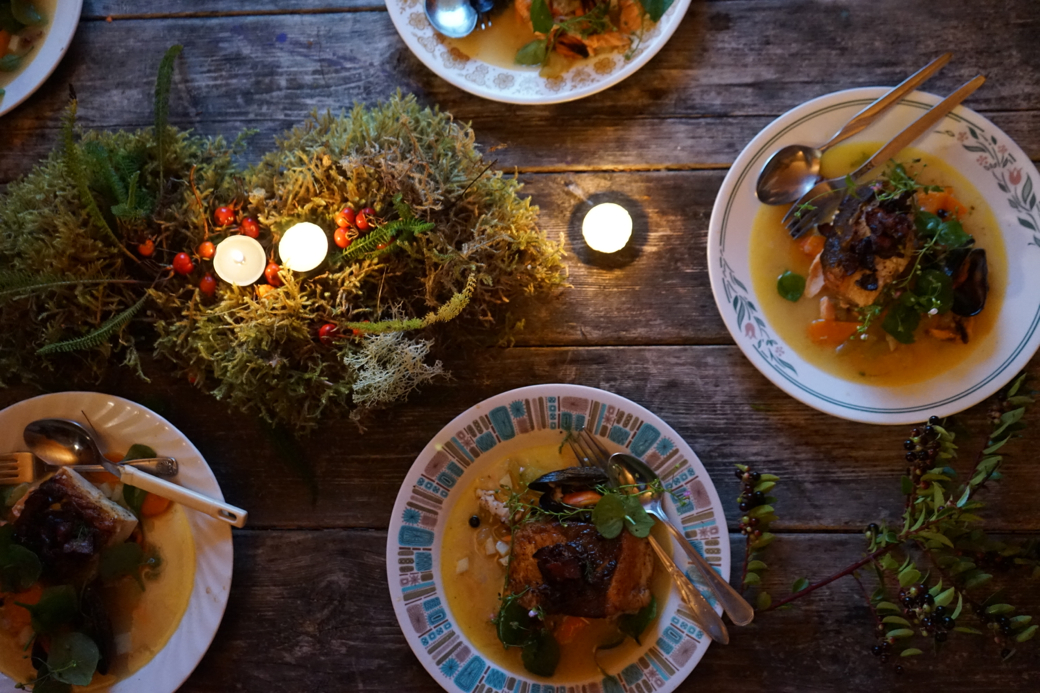
Photo by Toque & Canoe
I’m recalling a conversation I have with Ray Williams before I leave.
A joyful man with a ready sense of humour, he tells me he and his community want to build a good relationship with other Canadians so we can all live together in peace.
“I invite people to come and visit, to laugh with us, and to cry with us,” he says. “I invite them to come so we can share our stories.”
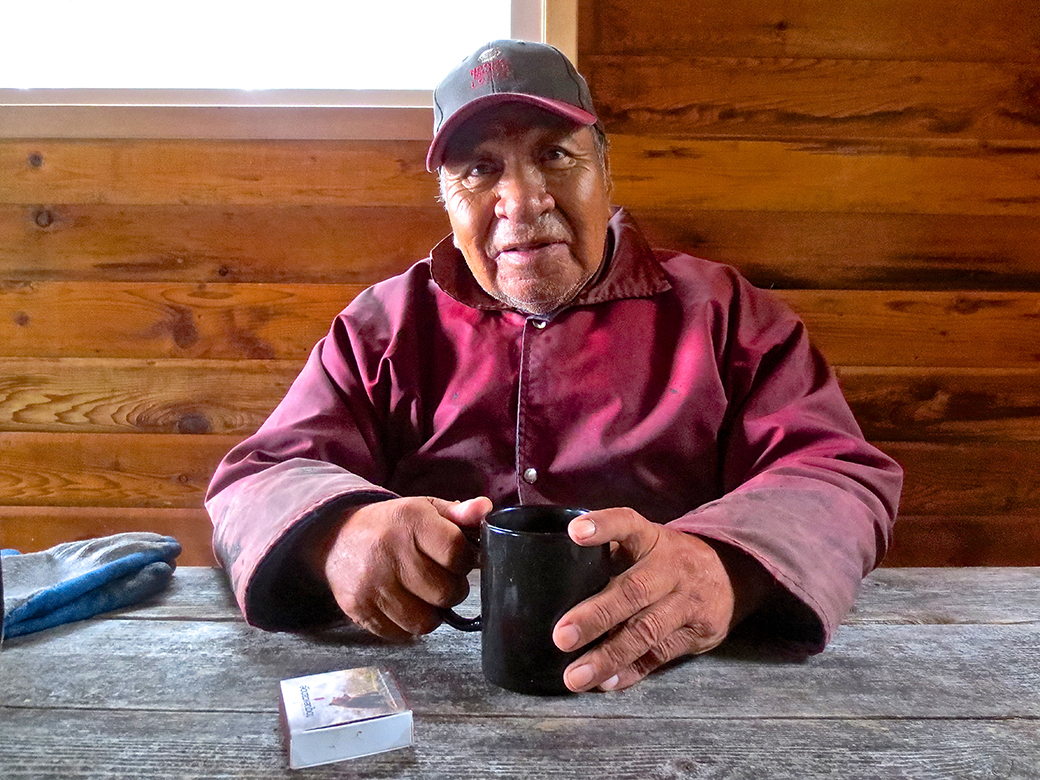
Elder Ray Williams / Photo by Toque & Canoe
Still, there are a handful of items in Canadian history that he’d like to name while he’s still alive.
Putting Aboriginal people on reserves — away from their traditional territories and to make room for newcomers to the country — was a cruel thing for the Canadian government to do, says the 75-year-old matter-of-factly.
Also, he continues, in the 1940s the B.C. government sunk, burned and towed away the boats of Aboriginal fishermen because the government wanted control over the fisheries.
“That, too, was cruel,” says Williams. “This is how we were feeding our families. I was a little boy when they seized my father’s boat. I remember it clearly.”
Finally, he concludes: “My name isn’t actually Ray Williams.” He goes on to explain he was given that name by a commissioner visiting his village when he was a child.
“My real name is GHOO-NOOM-TUK-TOMLTH. Which means Spirit of the Wolf. My father was from the Wolf Clan,” he says, before adding: “Say my name, Kim. Say it out loud.”
I ask him to repeat it once more, and then I say his name. “GHOO-NOOM-TUK-TOMLTH.”
Satisfied, we smile at each other and nod. In our own small way, in this remote and storied corner of Canada, we feel like we just made history.
Founded by two Canucks on the loose in a big country, Toque & Canoe is a blog about Canadian travel culture.


Lorna Crozier commented:
I love this story. I could smell the ocean and hear it rolling over those smooth pebbles. I could smell the salmon smoking over the open fire–my mouth is still watering. What a great way to cook it!
But what I loved best was the conversation between Kim and Ghoo-Noom-Tuk-Tomlth. So many things I need to learn.
Terry commented:
This magical place is on my bucket list. I have a deep appreciation for First Nations culture, art, food and stories. Thank you for this writing this piece and giving me a preview of what I may see when I finally get to visit.
Debbie commented:
Yuquot. Is an awesome place to visit I was there a few times. And I thought I was in heaven fresh salmon fresh oysters smoked right at the beach sitting there watching all the beautiful Eagles fly over us. And even went fishing. It was an awesome experience. Even to hike the trails. It was peace and quiet.
Laura commented:
I was hoping this is The ones that I meet through Doug Boogie yrs ago in Gold River I had the most memorable time with you thanks if this is you If so please return
toque & canoe commented:
Hi Laura. Thanks for commenting. If we’re talking about the same people that are featured in this post, if they are the ones you met through Doug, then we understand. We had a memorable time with them too!